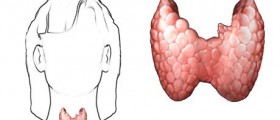
What is Hypothyroidism?
Hypothyroidism affects the thyroid gland and as the prefix hypo- says itself the condition is characterized by insufficient production of thyroid hormones. Our body simply cannot function without adequate amounts of thyroid hormones. This is why hypothyroidism may precipitate severe health issues and left untreated easily leads to lethal outcome. In infants undiagnosed hypothyroidism is one of many underlying causes of cretinism.
According to experts the majority of cases of hypothyroidism are associated with lack of iodine in one's body. However, the condition may also result from several diseases directly affecting the thyroid gland (e.g. de Quervain's thyroiditis) or tumors and injury to the pituitary gland, the master gland of the human body which controls many other endocrine gland including the thyroid gland. It is also possible to inherit hypothyroidism from parents when the disease is transmitted in an autosomal recessive pattern and occurs sporadically. And finally, sometimes insufficient production of thyroid hormones develops due to intake of certain drugs. Lithium-based mood stabilizers, for instance, may have hypothyroidism as one of many side effects.
How does It Affects Body Weight?
The thyroid gland and hormones it produces are in charge of bodily functions such as growth, healthy energy levels and desirable or optimal metabolic rate. Thyroid hormone deficiency drastically reduces the body's metabolic processes and interferes with specific functions like the regulation of body temperature, muscle contractions, blood circulation, food digestion as well as elimination of many waste products from the body.
Now, practically all symptoms these patients develop are closely connected with lack of effects of thyroid hormones on the metabolism. Reduced metabolic rate is, for example, responsible for fatigue, slow heart rate, intolerance to cold and inhibited sweating. Muscle pain may occur as well. Slow metabolism is additionally a powerful trigger of depression, which is the key psychological consequence of the disease. In women lack of thyroid hormones may affect menstrual cycles or even lead to infertility.
When it comes to weight gain in patients suffering from hypothyroidism, it is essential to mention that it is basically related to decreased metabolic rate. Namely, when metabolism is slow, the body cannot burn fat. This explains why such patients are prone to weight gain even when their daily caloric intake is within optimal range. What is more, lack of thyroid hormones is blamed for loss of muscle tissue. In case of such loss there is a decline in the basal metabolic rate of the affected person. The explanation is quite simple. The less muscle tissue we have, the less calories are burned within a day. The metabolism actually takes place in muscles so even a minor loss of muscle tissue/mass may significantly interfere with metabolic rate.
Constipation along with inadequate digestion and elimination of food are additional reasons why these patients struggle with excess weight.
All the previously mentioned clarifies why patients suffering from hypothyroidism are prone to obesity and why it is so hard for them to lose weight.
Controlling Weight is not an Easy Task
Losing weight is always a challenging task, making us search for the easiest solution in order to avoid diets, exercise and similar hard tasks. Even though the attempt to lose weight may seem futile in people suffering from hypothyroidism, medical experts claim how even these individuals may successfully lose weight and prevent the very obesity along with all the accompanying medical issues.
As it has already been mentioned hypothyroidism brings along a decline in metabolism. Patients also struggle with fatigue and are rather tired which makes them lazy and not willing to participate in physical activity which makes matters only worse.
Weight loss management may start once the condition is brought under control. So, after being diagnosed, patients will be prescribed with thyroid hormone supplements, most commonly levothyroxine. By doing so, the metabolism will definitely increase, and fatigue will diminish and become less severe making patients more eager to participate in physical activity.
Even once the function of the thyroid glands is restored, a person may experience difficulty losing weight. This puts more pressure, becomes frustrating and may result in giving up.
In order to avoid dissatisfaction and be motivated to lose weight patients are due to consult their health care provider and also include a well-experienced dietician in the entire process of weight loss.
Physicians are there to control the very disease and recommend the most convenient type of physical activity for weight loss. They should also motivate their patients and help them remain persistent in the decision to lose weight. Dieticians can create a suitable diet, allowing optimal intake of all the vital nutrients, minerals and vitamins while the caloric intake can be reduced which results in weight loss in the long run.
All in all, determination is the key factor in weight loss. One needs to set goals and know what he/she wants and with proper assistance of medical experts as well as the family he/she will eventually fulfill all the expectations.




-In-Adults_f_280x120.jpg)












Your thoughts on this
Loading...